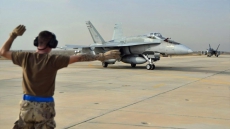HALIFAX — The Australian doctor who played a pivotal role in rescuing 12 boys and their soccer coach from a flooded cave in Thailand last year says he initially thought the plan to save the children was doomed to fail.
Dr. Richard Harris, in a gripping speech Wednesday to emergency physicians in Halifax, said he was convinced the decision to administer anesthetic to the boys to keep them calm during the three-hour underwater rescue operation was too risky.
"I was very adamant that this was not possible," said Harris, an anesthetist and cave diving expert. "I said, 'I really can't make any decisions until I dive to the cave, see the boys ... and I'll get back to you.' "
On July 2, 2018, the Wild Boars soccer team and their 25-year-old assistant coach were found alive in a partially flooded cave by two British divers, nine days after they were last seen entering the Tham Luang cave complex in a mountainous area near Mae Sai.
They couldn't get out because monsoon rains, which came early that year, had flooded the narrow passageways that led to the outside.
The boys, who ranged in age from 11 to 16, and their coach had no food, but they survived by drinking the fresh water in the cave, which was about 2.5 kilometres from the entrance. About half of that length was submerged in murky water.
"By nine days, the world — including people who has some understanding of the conditions they might be facing — were convinced that the children would all be deceased," said Harris, a resident of Adelaide who describes himself as "an ordinary bloke with a strange hobby."
It would take another nine days to get them out, an ordeal that would capture the attention of people around the world.
Harris said it was unrealistic to think the boys could escape by donning diving gear and squeezing through the tight, underwater crevices in utter darkness.
"You couldn't just teach them to cave dive and expect them to handle that kind of terrain," he said.
When Harris was first asked about sedating the children, he dismissed the idea — largely based on a previously failed experiment he attempted under controlled conditions.
"My response was immediate and emphatic: 'That is the most outrageous suggestion I've ever heard.' And as an anesthetist and a cave diver, I could think of 100 reasons why that would be doomed to kill the children in very short order."
However, if the trapped team was left to wait for the water to recede — a seven-month process — they would run out of time. Some of the boys were already suffering from chest and foot infections amid cramped, muddy conditions.
Harris said the only remaining option was to reach the boys, put them to sleep with an anesthetic known as ketamine and then send them on their way, each strapped to a rescue diver.
"I can't describe how chaotic and frenetic the atmosphere in that water was — and of course, you can't see anything," he said.
"I had my eyes closed for most of the time. It's zero visibility. You're just following a rope .... You might have to turn yourself on your side and keyhole yourself through."
At that point, he rated his chances of success at "close to zero."
"I still could not imagine how you could immerse and anesthetize a child in the water for three hours without any kind of medical supervision or monitoring," he said.
"The main priority for me was that these children didn't wake up, thrash around and drown their rescue diver."
Once inside Chamber 9, the cave where the boys were trapped, Harris got to work.
After each boy was put to sleep and fitted with a face mask, the divers bound their hands behind their backs and tied their ankles together.
"We couldn't have their arms and legs flailing," he said. "We made them into what we called the inert patient package."
During his speech, Harris displayed several photos from the rescue effort, including a picture from inside Chamber 9 showing him immersing a masked, sleeping child into the water.
"The first time I pushed a boy's face into the water, I found that really confronting and a terrible thing to do — second only to tying their hands behind their back," he said.
"But as you know, they all came out."
Afterwards, Harris said he felt his actions in the cave were somewhat "wreckless and foolish," but he changed his mind two weeks later when he saw photos of the flooded village of Mae Sai.
"Once this happens, there's no one going near that cave. Those kids would have absolutely died a very slow and lingering death. That kind of helped me with my decision."


